| Srl | Item |
| 1 |
ID:
146542


|
|
|
|
|
| Summary/Abstract |
Focusing on the dispute resolution mechanisms for defusing various social disturbances and collective incidents during the reform period and particularly in the last decade, this paper argues that the Chinese government has adopted pragmatic and problem-solving approaches to designing and developing various mechanisms of dispute resolution in response to the complicated and challenging situation of steadily increasing and intensifying social contention. There is evidence that neither litigation nor non-litigation means of dispute resolution can effectively resolve social conflicts. In light of this difficulty, various experiments have been put in place at the local level to meet social needs and manage social crises while balancing state power and social self-governance. We call such experiments “diversified mechanisms of dispute resolution (DMDR).” This study sheds light on the shift from an emphasis on the earlier non-litigation approach to a more diversified way of addressing collective disputes in contemporary China.
|
|
|
|
|
|
|
|
|
|
|
|
|
|
|
|
| 2 |
ID:
146544
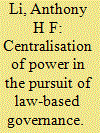

|
|
|
| 3 |
ID:
146538
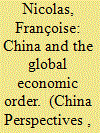

|
|
|
|
|
| Summary/Abstract |
Having long remained a passive presence within multilateral economic organisations, China recently changed its stance when the United States was faced with a major financial crisis. The present article re-examines China’s recent initiatives in matters of global economic governance from a long-term perspective. From this analysis it will emerge that in parallel with its economic takeoff, China has progressively shifted from a stance in favour of the global economic order – as defined and imposed following the Second World War – to a simple reformist approach that did not fundamentally challenge the established order, and then more recently to an increasingly overt revisionist approach, accompanied by the establishment of new institutions under Chinese influence. That being said, while China’s strategy is becoming more offensive, it remains fundamentally experimental in nature and the end goal remains unclear. Under the current conditions, it is far from certain that we are heading for a new global economic order where China rules supreme.
|
|
|
|
|
|
|
|
|
|
|
|
|
|
|
|
| 4 |
ID:
146543
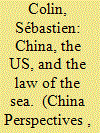

|
|
|
| 5 |
ID:
146540
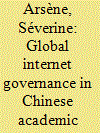

|
|
|
|
|
| Summary/Abstract |
This article explores the apparently ambivalent foundations of the notion of cybersovereignty as seen from China, through some of the most recent Chinese academic literature on global Internet governance. It shows that the sampled authors conceive of the current Internet order as an anarchic or disorderly space where global hegemons reproduce their domination over the world in the digital age. In the rather dichotomous world that this portrays, most of the authors concentrate their attention on the position and strategy of the United States, with a view to underlining the contradictions in American discourse through the PRISM scandal or the status of ICANN. In this context, most scholars studied here see the current situation, where Internet governance is increasingly debated, as an opportunity to rebalance the global Internet order and advance the strategic interests of China through the establishment of an intergovernmental Internet governance framework in the long term, and through active participation in the current status quo in the short term.
|
|
|
|
|
|
|
|
|
|
|
|
|
|
|
|
| 6 |
ID:
146539
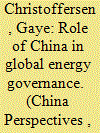

|
|
|
|
|
| Summary/Abstract |
Global energy governance institutions pressure China, which has ungoverned domestic energy spaces, to reform and strengthen its capacity for domestic energy governance. Rather than reform, China has attempted to create an alternative global energy order and establish a leadership role using the BRICS framework. However, BRICS exist in the global ungoverned energy space and have not prioritised energy governance. Additionally, BRICS practice shared leadership, undermining potential Chinese leadership. Beijing has subsequently shifted to the “Silk Road Economic Belt,” a vehicle for uncontested Chinese leadership in energy.
|
|
|
|
|
|
|
|
|
|
|
|
|
|
|
|
| 7 |
ID:
146541


|
|
|
|
|
| Summary/Abstract |
Hong Kong’s greater economic integration with China has continued to underpin its service oriented economy following the manufacturing sectors’ hollowing out since the 1990s. Hong Kong is an important transit hub for China’s external trade, especially for the Pearl River Delta Region. China’s deregulation of mainland visitors to Hong Kong under the Individual Visit Scheme since 2003 has contributed to Hong Kong’s bulging trade surplus in travel. Nonetheless, the tremendous business opportunities from China’s financial reform won’t unseat the US and the UK as Hong Kong’s top trade partners in financial services. Overall, Hong Kong’s service economy will continue to prosper in the near term with China’s continuous granting of special treatment. In the long run, strengthening Hong Kong’s bridging role between mainland China and the global market will be crucial for the viability of its services.
|
|
|
|
|
|
|
|
|
|
|
|
|
|
|
|